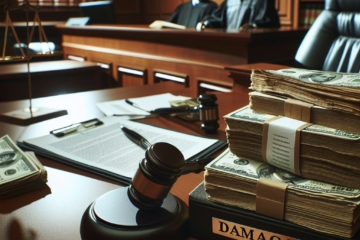Table of contents
Understanding Foreclosure in Civil Litigation: BC Lawyers Guide
Foreclosure is a complex legal process that involves the taking of possession and sale of a property by a lender to recover the outstanding debt owed by the borrower. In the province of British Columbia (BC), lawyers play an essential role in guiding clients through foreclosure proceedings. This article aims to provide an overview of foreclosure in civil litigation, highlight the essential role of BC lawyers, explain the legal process and requirements involved, and discuss key considerations for lawyers handling foreclosure cases in BC.
Overview of Foreclosure in Civil Litigation
Foreclosure is a legal remedy available to lenders when borrowers default on their mortgage payments. In civil litigation, foreclosure refers to the legal process through which a lender seeks to recover the debt owed by selling the property used as collateral for the loan. This process allows the lender to obtain a court order to take possession of the property and sell it to repay the outstanding debt. The purpose of foreclosure is to protect the lender’s rights and interests while providing a means for borrowers to resolve their financial obligations.
Essential Role of BC Lawyers in Foreclosure Proceedings
BC lawyers play a crucial role in foreclosure proceedings, representing either the lender or the borrower. They provide legal advice and guidance throughout the entire process, ensuring that their clients’ rights are protected and their interests are adequately represented. For lenders, lawyers assist in initiating foreclosure actions, preparing necessary documents, and representing them in court. For borrowers, lawyers help navigate the legal process, explore possible defenses, negotiate with the lender, and seek alternative solutions to foreclosure.
Understanding the Legal Process and Requirements
Foreclosure in BC involves a series of legal steps and requirements that must be followed to ensure a fair and lawful process. BC lawyers possess a deep understanding of these processes and requirements, which include filing a petition, serving notice to the borrower, conducting a hearing, obtaining a court order, and initiating the sale of the property. Lawyers guide their clients through each stage, ensuring compliance with the applicable laws and regulations and safeguarding their clients’ rights.
Key Considerations for Lawyers Handling Foreclosure Cases in BC
Handling foreclosure cases in BC requires lawyers to consider various factors to effectively represent their clients. These considerations include assessing the borrower’s financial situation, exploring potential defenses or counterclaims, negotiating with the lender to reach a settlement or repayment plan, and advising clients on the potential consequences of foreclosure. Lawyers must also stay updated with changes in foreclosure laws and regulations to provide accurate and reliable advice to their clients.
In conclusion, foreclosure in civil litigation is a complex legal process that requires the expertise of BC lawyers. These legal professionals play a critical role in guiding clients through foreclosure proceedings, ensuring compliance with legal requirements, and protecting their clients’ rights and interests. Understanding the legal process and requirements, as well as considering key factors, enables lawyers to effectively handle foreclosure cases in BC and provide their clients with the best possible legal representation.
Frequently Asked Questions
What is foreclosure in civil litigation?
Foreclosure in civil litigation is the legal process where a lender takes possession of a property from a borrower who has defaulted on loan payments, allowing the lender to sell the property to recover the debt.
In BC, foreclosure follows a legal procedure, including petitioning the court, notifying the borrower, attending a hearing, obtaining a court order, and then selling the property to settle the debt.
BC lawyers represent either lenders or borrowers, providing essential legal advice, preparing documents, and advocating for their clients’ rights throughout the foreclosure process.
How can a lawyer help a borrower facing foreclosure?
Lawyers can help borrowers explore defenses, negotiate with lenders, and consider alternative options to foreclosure to protect their property and financial stability.
The purpose of foreclosure is to protect the lender’s interests by recovering the outstanding debt owed by the borrower, often through the sale of the collateral property.
Why is legal representation important in foreclosure cases?
Legal representation ensures that clients’ rights are protected, the process is followed lawfully, and all legal options are explored to prevent or manage foreclosure effectively.
Can borrowers defend against foreclosure?
Can borrowers defend against foreclosure?
Yes, borrowers may have potential defenses against foreclosure, such as proving procedural errors or negotiating a payment plan with the lender.
What are the main steps in the foreclosure process?
The foreclosure process includes filing a petition, notifying the borrower, conducting a court hearing, obtaining a court order, and then selling the property to recover the debt.
Lawyers help lenders prepare documents, file for foreclosure, and represent them in court to ensure their interests are upheld throughout the proceedings.
A foreclosure petition is the legal document filed by the lender to initiate foreclosure proceedings in court.
Yes, alternatives include loan modifications, repayment plans, or voluntary property surrender by the borrower.
What is the outcome of a successful foreclosure?
What is the outcome of a successful foreclosure?
The lender takes possession of the property, sells it, and uses the proceeds to cover the outstanding loan balance.
Is foreclosure common in BC?
Foreclosure can occur in BC when borrowers default on mortgage payments, and it involves a standardized legal process to ensure fair handling of such cases.
How long does the foreclosure process take in BC?
The timeframe for foreclosure varies, depending on court schedules and case complexity, typically taking several months to over a year.
In some cases, a borrower can stop foreclosure by negotiating a settlement with the lender or by court intervention.
Legal requirements include court petitions, serving notices, attending hearings, and following proper sale procedures to finalize foreclosure.
Do foreclosure laws differ across provinces in Canada?
Yes, foreclosure laws can vary by province, so it’s essential for lawyers to be familiar with BC’s specific foreclosure laws and processes
Important: Please note that the information here is not meant to be legal advice. Do not solely rely on the information given here; it is important that you consult with a lawyer regarding any legal advice. Pax Law Corp. is not responsible for any reliance on the contents of this blog post. Any faces posted on this blog post is totally AI generated and they are not intended to represent any person in the real world. Any similarities are completely coincidental.



0 Comments